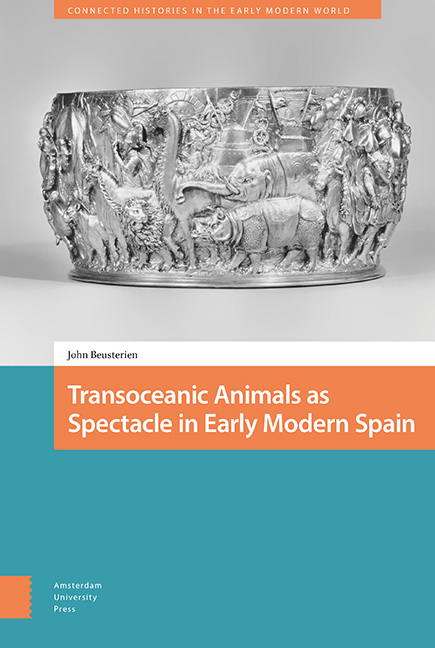Book contents
- Frontmatter
- Dedication
- Contents
- List of Illustrations
- Prologue
- Introduction: Armored Beasts and the Elephant in the Room
- 1 Hawa’i the Elephant and Abada the Rhinoceros
- 2 Fuleco the Armadillo
- 3 Jarama the Bull and Maghreb the Lion
- Conclusion: Biogeography as a Teaching Tool
- Appendix 1 Biogeography Course Project: Naming an Early Modern Animal
- Appendix 2 Bibliography for the Study of Animals and Early Modern Spain
- Index
Conclusion: Biogeography as a Teaching Tool
Published online by Cambridge University Press: 21 November 2020
- Frontmatter
- Dedication
- Contents
- List of Illustrations
- Prologue
- Introduction: Armored Beasts and the Elephant in the Room
- 1 Hawa’i the Elephant and Abada the Rhinoceros
- 2 Fuleco the Armadillo
- 3 Jarama the Bull and Maghreb the Lion
- Conclusion: Biogeography as a Teaching Tool
- Appendix 1 Biogeography Course Project: Naming an Early Modern Animal
- Appendix 2 Bibliography for the Study of Animals and Early Modern Spain
- Index
Summary
Abstract
The conclusion examines how teachers can use the methodology of biogeography—that is, teachers can guide students by having them name a previously unnamed animal from early modern Spain. For instance, students can name a quetzal whose feathers were used by an Amanteca artisan to craft a shield that Philip II received as a gift and put in his collection in the Royal Armory. The teaching methodology of biogeography— creating names of animals in spectacles of animals in early modern Spain—helps prepare students in the humanities to look beyond the superficial interpretation of images and texts to better understand landscapes of exclusion.
Keywords: biogeography in teaching, feather shield (adarga), Amanteca, quetzal, Philip II of Spain (1527–98)
Many animals, especially dogs, were given proper names in early modern Spain. When Gonzalo Argote de Molina describes how Philip II's court hunted down an escaped lion, he does not give a name for the lion, but describes a Spanish dog who had a French name, Lionel (“Little Lion”). Argote mentions many other proper names for dogs in his book on hunting. In the chapter titled “De la fidelidad de los canes y diferencias de sus nombres” (“Of Dog's Faithfulness and Their Different Names”), Gonzalo Argote de Molina writes that the dogs from England and Ireland had names whose pronunciation was strange and, when those dogs arrived in Spain, Spanish hunters butchered their names so badly that, although Argote knew their names, he decided not to mention them. Argote does, however, mention the names of Philip II's well-known hunting dogs, such as Bocanegra and Manchado (a dog name that Cervantes also used for a sheepherding dog in Galatea). Argote also mentions two other canines: Amadis, who belonged to Lorenzo Suárez de Figueroa (1345–1409), the legendary founder of the Order of Santiago in Seville, and Mahoma (“Mahommed”), the famous dog who earned a salary fighting Moors on behalf of his master Día Sánchez de Carvajal (ca. 1380–ca. 1467).
In contrast to Argote, who memorialized the names of famous historical dogs, this book has named five animals that were never given proper names. Abada the rhinoceros and Hawa’i the elephant were diplomatic gifts from the Mughal Empire to the Habsburgs.
- Type
- Chapter
- Information
- Transoceanic Animals as Spectacle in Early Modern Spain , pp. 223 - 236Publisher: Amsterdam University PressPrint publication year: 2020



